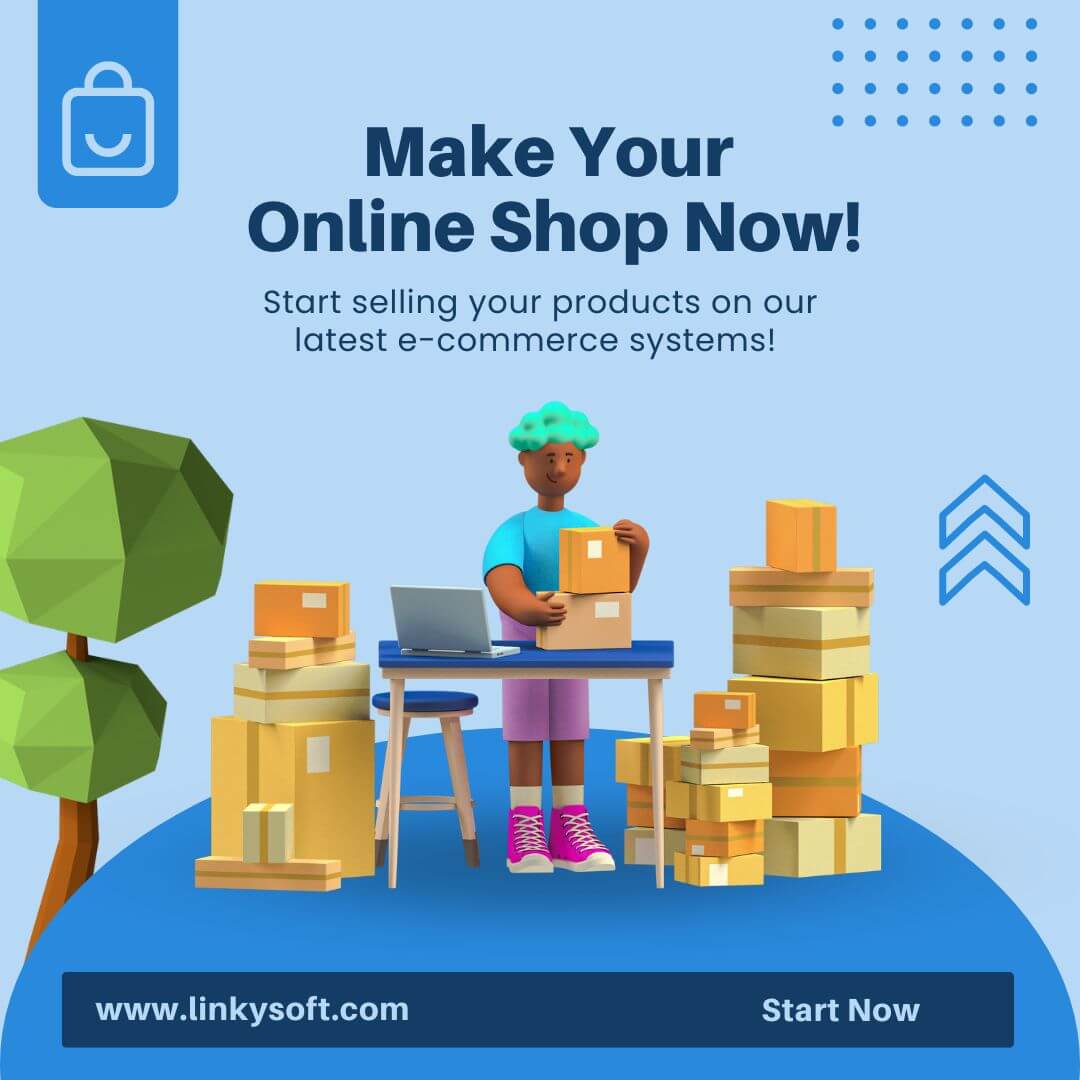As the e-commerce industry continues to grow, more entrepreneurs are establishing small online stores as a cost-effective and efficient way to sell products to a global audience. However, while setting up an online store has become easier thanks to platforms like Shopify, WooCommerce, and specialized systems like Linkysoft e-commerce systems, managing these stores effectively and ensuring continuous growth is still a challenge.
For small online store owners, the key to long-term success is not just in setting up a store but in mastering various aspects such as customer service, inventory management, marketing strategies, and using the right e-commerce tools. This article aims to explore these aspects in-depth, offering detailed strategies and insights on how to manage small online stores efficiently while achieving continuous and scalable growth.

Understanding the Fundamentals of Small Online Store Management
Importance of Effective Store Management
Managing a small online store is about much more than listing products. From the moment a customer visits your site until they receive their order, every interaction must be seamless. This includes managing inventory, processing orders, handling shipping logistics, and providing excellent customer service. Effective store management ensures that all these components work together harmoniously.
Store management tools, like those offered by Linkysoft, play a crucial role in simplifying these tasks. An e-commerce platform that integrates inventory management, order fulfillment, and customer service will allow you to focus on growing your business rather than getting bogged down in operational details.
Using E-commerce Management Systems for Automation
Automation is one of the most valuable aspects of modern e-commerce. It reduces manual errors, saves time, and helps you scale your operations efficiently. Systems like Cartz offer automation features that handle everything from stock management to order fulfillment. By using automated systems, you can ensure that your store runs smoothly without the need for constant supervision.
For example, you can set up automatic inventory updates when products are sold, ensuring that your customers never face stock issues. Automated email notifications can keep customers informed about their orders, while analytics tools provide valuable insights into customer behavior and sales trends.
Inventory Management for Small Online Stores
Optimizing Stock Levels
Maintaining the right stock levels is a balancing act. Overstocking can lead to increased storage costs and the risk of products becoming obsolete, while understocking can result in lost sales and disappointed customers. For small online stores, this balance is especially important as limited resources make stock mismanagement more impactful.
Using an inventory management system like Togar helps you optimize stock levels by providing real-time updates on your inventory, automatically reordering products when stock levels are low, and offering insights into which products are selling quickly and which are not.
Real-Time Inventory Tracking
One of the biggest challenges for small online stores is keeping track of inventory in real-time, especially if you're selling across multiple platforms such as your own website, Amazon, or eBay. Real-time inventory tracking ensures that stock levels are updated across all platforms the moment a sale is made, preventing issues like overselling or stockouts.
Togar Pro offers integrated real-time inventory tracking that syncs with multiple sales channels, ensuring consistency across your entire inventory. This not only improves the customer experience but also helps you maintain better control over your stock levels.
Customer Service: A Cornerstone of Store Growth
Providing Stellar Customer Support
Customer service is a key factor in determining the success of a small online store. In the highly competitive e-commerce market, offering excellent customer support can be the differentiating factor that leads to customer loyalty and repeat business. Customers want fast, effective solutions to their problems, and they expect businesses to be responsive and proactive.
To achieve this, you need to have an integrated customer support system that allows you to manage inquiries efficiently. Tools like live chat, email ticketing systems, and automated responses can improve the overall customer experience. Additionally, ensuring that customers can easily find answers to their questions through FAQs or help centers on your site can further enhance satisfaction.
Implementing Feedback Systems
Feedback systems are essential for continuous improvement. Encouraging customers to leave reviews and provide feedback allows you to gather insights into their experiences and expectations. By analyzing this feedback, you can make adjustments to your products, website, or customer service practices to better meet customer needs.
Many e-commerce systems offer built-in tools for collecting and managing customer feedback. For example, after a purchase, you can automate emails asking for reviews or offer incentives like discounts for leaving detailed feedback. This feedback not only helps improve your services but also serves as social proof that can attract more customers.
Marketing Strategies to Grow Your Online Store
Utilizing SEO to Drive Traffic
Search engine optimization (SEO) is a powerful marketing tool for driving organic traffic to your online store. By optimizing your website for relevant keywords such as "How To Manage Small Online Stores And Achieve Continuous Growth," you can increase your store's visibility on search engines like Google. This involves optimizing product descriptions, meta tags, and even your blog content to target keywords that potential customers are searching for.
In addition to on-page SEO, building backlinks from trusted sites, improving site speed, and ensuring mobile responsiveness are all factors that contribute to higher search engine rankings. Using tools such as Google Analytics to track your SEO performance can help you adjust your strategy for better results over time.
Investing in Paid Advertising
While SEO is a long-term strategy, paid advertising offers more immediate results. Platforms like Google Ads and Facebook Ads allow you to target specific demographics with your ads, ensuring that your marketing efforts reach the right audience. By investing in paid advertising, you can drive targeted traffic to your online store and increase your chances of converting visitors into paying customers.
However, it's important to track the performance of your ads to ensure you're getting a good return on investment (ROI). Your e-commerce management system should offer integrated analytics tools that help you measure the success of your paid campaigns and adjust your strategy accordingly.
Streamlining Order Fulfillment and Shipping
Automating the Fulfillment Process
Order fulfillment is a critical component of running a successful online store. Customers expect their orders to be processed quickly and accurately, and any delays or mistakes in this process can lead to negative reviews and lost sales. Automating the fulfillment process through your e-commerce management system ensures that orders are processed efficiently and shipped on time.
With systems like Cartz, you can automate tasks such as printing shipping labels, updating order statuses, and sending tracking information to customers. This not only saves time but also reduces the risk of human error.
Managing Returns and Exchanges
A smooth returns and exchanges process is just as important as timely order fulfillment. Offering a hassle-free return policy encourages customers to shop with confidence, knowing that they can easily return or exchange products if needed. Automating the return process can help you manage this aspect of your business more efficiently.
For example, you can use your e-commerce system to generate return labels automatically and update the order status once the return is received. This allows you to keep track of returns and process refunds or exchanges quickly, improving customer satisfaction.
Financial Management and Analytics
Tracking Sales and Revenue
Accurate financial management is essential for the long-term success of any business, and e-commerce is no exception. Keeping track of your sales, expenses, and overall revenue helps you make informed decisions about pricing, promotions, and product investments. A reliable e-commerce management system offers built-in financial tools that allow you to track these metrics in real-time.
For instance, systems like Cartz provide detailed reports on your sales performance, helping you identify which products are performing well and which are underperforming. These insights allow you to adjust your inventory and marketing strategies to focus on high-demand items.
Using E-commerce Reports for Growth
Beyond tracking sales, e-commerce reports provide valuable data that can help you plan for the future. For example, customer behavior reports can give you insights into how customers are navigating your website, which products they are most interested in, and where they are dropping off in the sales funnel. Armed with this information, you can optimize your website's user experience to increase conversions.
Additionally, revenue reports allow you to see which times of the year are most profitable, helping you plan seasonal promotions and adjust your marketing efforts accordingly. By leveraging the reporting tools available in your e-commerce management system, you can make data-driven decisions that contribute to continuous growth.
Scaling Your Business: Expanding to New Markets
Exploring International Sales
As your business grows, expanding into international markets can be a lucrative way to increase sales and revenue. However, selling internationally comes with its own set of challenges, including dealing with multiple currencies, shipping logistics, and compliance with local regulations. Using an e-commerce system like Togar Pro that supports multi-currency transactions and offers built-in shipping solutions for international orders can simplify this process.
Additionally, providing your website in multiple languages and offering local payment methods can help you cater to a global audience more effectively. Expanding internationally allows you to tap into new customer bases, increasing your overall revenue potential.
Collaborating with Multiple Vendors
If you're running a multi-vendor e-commerce store, managing relationships with multiple vendors is critical to ensuring product availability and quality. A system like Togar offers tools that streamline vendor communication, automate order processing, and provide transparency into vendor performance.
This is especially important if you're managing a large catalog of products from different suppliers. Efficient vendor management allows you to maintain product quality, ensure timely delivery, and prevent stockouts, all of which contribute to a positive customer experience.
Building Long-Term Relationships with Customers
Implementing Loyalty Programs
Customer retention is just as important as customer acquisition, if not more so. Studies have shown that it is significantly cheaper to retain existing customers than to acquire new ones, making loyalty programs an effective strategy for long-term growth. By offering rewards for repeat purchases, you can encourage customers to return to your store regularly.
Your e-commerce system should offer integrated tools for managing loyalty programs. For example, you can create a points-based system where customers earn points for every purchase they make, which can later be redeemed for discounts or free products. Personalizing these rewards based on customer preferences further enhances their shopping experience.
Personalizing the Shopping Experience
In addition to loyalty programs, personalizing the shopping experience can have a significant impact on customer satisfaction and retention. This can be achieved by using data from your e-commerce system to offer personalized product recommendations, special promotions, and tailored content.
For instance, you can segment your customer base based on their purchase history and send targeted email campaigns offering products that align with their interests. Personalized shopping experiences make customers feel valued and increase the likelihood of repeat purchases.
Conclusion: Achieving Continuous Growth
Managing a small online store requires a combination of strategic planning, efficient operations, and the right tools. By implementing the strategies discussed in this article—such as optimizing inventory management, providing excellent customer service, utilizing e-commerce management systems like those offered by Linkysoft, and leveraging data analytics—you can ensure the long-term success and growth of your business.
Continuous growth is not a one-time effort but a journey. Staying up-to-date with the latest e-commerce trends, tools, and best practices will allow you to adapt to changes in the market and capitalize on new opportunities. By maintaining a customer-centric approach and using advanced e-commerce systems, your small online store can thrive in today's competitive digital landscape.








